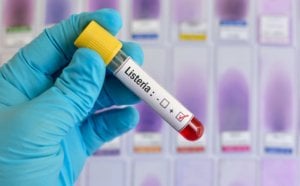A Listeria outbreak linked to deli meat that has sickened 16 people killing one of them is the latest chapter in the lethal history of Listeria in deli meat. Almost 20 years ago, after two of the most deadly foodborne illness outbreaks in the U.S.history were linked to deli meat, the U.S. Department of Agriculture changed its policy on the regulation of these foods.
Today, companies are supposed to use one of three methods to control the presence of Listeria, which thrives in cool, damp environments like refrigerated manufacturing facilities. They can use both a post-cooking treatment such as pasteurization along with an antibacterial agent. They can use either a post-cooking treatment or an antibacterial agent. Or, they can use sanitation methods only. The frequency of government supervision is supposed to increase with each step down.
Until 2018, it had been years since the Centers for Disease Control and Prevention (CDC) had announced a multi-state Listeria outbreak linked to deli meat. But since then, four fatal Listeria outbreaks linked to deli meat have occurred.

Along with dairy products, smoked salmon, and unpasteurized juices and milk, deli meats are one of the foods most commonly associated with Listeria poisoning.
Listeria bacteria are found in nature and can be carried by animals who show no sign of illness. When food contaminated with Listeria is eaten, it can cause serious illness and death. About 90 percent of all listeriosis cases require hospitalization and about 20 percent are fatal.
Symptoms of a Listeria infection include severe headache, high fever, stiff neck, other muscle stiffness, loss of balance, confusion, and gastrointestinal symptoms. These symptoms can appear within one day of exposure but sometimes it can take as long as 70 days for them to develop.
Pregnant women are at elevated risk for these infections which can cause miscarriage, stillbirth, premature delivery, and infection of newborns. Others at higher risk include seniors, small children, and people with compromised immune systems.
How are Listeria Outbreaks Identified?

Blood sample tube positive with Listeria bacteria
Listeriosis is a reportable disease. That means when people get Listeria poisoning their doctors need to report it to local health departments. Then, tests that identify the genetic “fingerprint” of the bacterial strain cultured from each patient are performed and uploaded to a national subtyping database maintained by the CDC, called PulseNet.
Fingerprint matches indicate that the people who got sick ate the same food. Sometimes, state health departments identify outbreaks, other times it’s the CDC.
When there are fingerprint matches, health officials gather information about the people who got sick. When did they first develop symptoms? What did they eat in the days and weeks before they became ill? Where did they purchase that food?
If a common food is identified, the regulatory side of the investigation kicks in. There are two government agencies that oversee food safety in the U.S. Generally speaking, the U.S. Department of Agriculture- through its Food Safety and Inspection Service (USDA FSIS) inspects meat and poultry. And the Food and Drug Administration (FDA) inspects everything else.
Investigators from these agencies conduct “traceback” investigations tracing the contaminated food back to its source. When the producer is identified, these investigators collect food and environmental samples from the facility where it was produced and test them for bacteria.
The Danger of Deli Meat
Although Listeria is not as common as other foodborne bacteria such as Salmonella or E. coli, it is the third-most deadly foodborne bacteria. In addition, to regulatory loopholes that allow manufacturers to skip post-cooking treatments and the use of antimicrobials, another reason deli meat poses a serious threat is cross-contamination.
Deli slicers can transfer bacteria from a contaminated ham onto all the other meats sliced on that slicer. A 2012 study by the CDC found that half of the delis studied did not clean their slicers every four hours as is specified. Purdue University did a similar study in 2015. Results from that study found Listeria on 6.8 percent of slicers in the morning before business hours when they would presumably be at their cleanest. Over the course of a month, they found 10 percent of samples taken from 30 delis tested positive for Listeria.
Listeria Outbreaks Linked to Deli Meat
2022 Deli Meat and Cheese Listeria Outbreak
Deli meat and cheese sold at NetCost and other stores has been linked to a deadly Listeria outbreak, the CDC announced on November 9, 2022. Sixteen people have been sickened, 13 have been hospitalized. One person has died and one pregnant woman has suffered a miscarriage.
2020 Deli Meat Listeria Outbreak
On October 23, 2020, the CDC announced a three-state Listeria outbreak linked to Italian-style deli meat that had sickened 10 people killing one of them. The people sickened, in Massachusetts, New York, and Florida, were tested for Listeria on dates ranging from August 6, 2020, to October 3, 2020. All of them were hospitalized.
2019 Deli Meat and Cheese Listeria Outbreak
On April 18, 2019, the CDC announced a four-state Listeria outbreak linked to deli meat and cheese that had sickened eight people killing one of them. The outbreak began in late 2016 with the two most recent cases reported in 2019.
Cases have been reported from Pennsylvania, Michigan and New York, and New Jersey. All of them were hospitalized. The fatality was reported in Michigan.
During interviews with health officials, case-patients reported eating meats and cheeses sliced at deli counters before they became ill. The outbreak strain has been identified in samples collected from multiple stores in New York and Rhode Island.
The people sickened in this outbreak range in age from 40 to 88 years old. The median age is 57. People who are at increased risk for Listeria infections are pregnant women, seniors, and people with compromised immune systems. Among pregnant women, Listeria can cause miscarriage and stillbirth.
2018 Johnston County Ham Listeria Outbreak
Health officials used Whole Genome Sequencing (WGS) to find the “fingerprint” of this outbreak strain and identified four case-patients who ranged in age from 70 to 81 years old. One person was from North Carolina and three people were from Virginia, one of whom died.
Outbreak investigators found the outbreak strain in deli ham produced by Johnston County Hams, Inc. of Smithfield, North Carolina. On October 3, 2018, Johnston issued a recall of ham products for potential contamination with Listeria bacteria.
2002 Pilgrim’s Pride Deli Turkey Listeria Outbreak
In 2002, a Listeria outbreak linked to Pilgrim’s Pride deli turkey sickened 53 people. Eight people died and three pregnant women suffered miscarriages or stillbirths. Investigators found the outbreak strain in environmental samples taken from the company’s Franconia, Pennsylvania plant and in two ready-to-eat turkey products. The company issued a recall for 27 million pounds of fresh and frozen ready-to-eat turkey and chicken products and voluntarily closed the plant for one month.
It was after this outbreak that the USDA changed its policy on deli meat.
1998 Bil Mar Deli Meat and Hot Dog Listeria Outbreak
In 1998, a Listeria outbreak linked to Bil Mar Foods sickened 101 people killing 21 of them. At least two pregnant women suffered miscarriages or stillbirths.
Experienced Listeria Lawyers
If you were sickened by deli meat contaminated with Listeria and would like a free consultation about a Listeria lawsuit, please contact our Listeria lawyers. Our Food Safety Team has more experience handling Listeria lawsuits than any other law firm in the country securing some of the largest Listeria settlements in U.S. history including a recent award of $6.4 million for neurologic injury from a contaminated deli product.
You can reach us by calling 1-888-377-8900, sending a text to 612-261-0856, or by completing the form below. There is no cost and no obligation and we don’t get paid unless we win.
Updated October 24, 2020 -This post was updated to include information about a new outbreak.
Updated November 14, 2022 – This post was updated to include information about a new outbreak.
